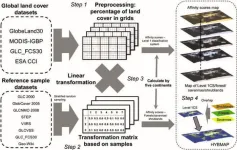(Press-News.org) Some deeper areas of the Great Barrier Reef are insulated from harmful heatwaves – but that protection will be lost if global warming continues, according to new research.
High surface temperatures have caused mass “bleaching” of the Great Barrier Reef in five of the last eight years, with the latest happening now.
Climate change projections for coral reefs are usually based on sea surface temperatures, but this overlooks the fact that deeper water does not necessarily experience the same warming as that at the surface.
The new study – led by the universities of Exeter and Queensland – examined how changing temperatures will affect mesophotic corals (depth 30-50 metres).
It found that separation between warm buoyant surface water and cooler deeper water can insulate reefs from surface heatwaves, but this protection will be lost if global warming exceeds 3°C above pre-industrial levels.
The researchers say similar patterns could occur on other reefs worldwide, but local conditions affecting how the water moves and mixes will mean the degree to which deeper water coral refuges exist and remain insulated from surface heatwaves will vary.
“Coral reefs are the canary in the coalmine, warning us of the many species and ecosystems affected by climate change,” said Dr Jennifer McWhorter, who led the research during a QUEX PhD studentship at the universities of Exeter and Queensland.
“Coral bleaching is a dramatic sign of the impact humans are having on the planet.
“Our study offers both hope and a warning – hope that some reefs are resilient to current levels of climate change, and a warning that this resilience has its limits.”
The study finds that 3°C of global warming would push mesophotic temperatures in the Great Barrier Reef past 30°C – a recognised threshold for coral mortality.
This does not necessarily mean that all coral would die, but it would place the reef in a state of stress that would increase mortality and possibly cause it to collapse.
Dr McWhorter, now at NOAA's Atlantic Oceanographic & Meteorological Laboratory, said: “Some shallow-water species are not found in deeper areas – so mesophotic reefs can’t provide refuges for them as shallow reefs are degraded.
“And, as our study shows, mesophotic corals are themselves threatened if global warming continues.”
To calculate their projections of mesophotic reefs warming, the research team considered factors such as wind and tidal mixing of water, and local complexities.
They estimate that, by 2050-60, bottom temperatures on the Great Barrier Reef (30-50 metres) will increase by 0.5-1°C under lower projected greenhouse gas emissions, and 1.2-1.7°C under higher emissions.
Dr Paul Halloran, from Exeter’s Global Systems Institute, said: “To protect coral reefs, we need to understand them better.
“Reefs face multiple threats – not just climate change. By targeting management of these threats on reefs that have the best chance of escaping the worst impacts of climate change, hopefully some healthy reefs can be maintained.
Professor Peter Mumby, from the University of Queensland, said: “There is so much to learn about deeper, tropical coral reefs, especially as we cannot assume that their depth provides a persistent refuge from the consequences of rising global carbon emissions.”
The paper, published in the journal Proceedings of the National Academy of Sciences, is entitled: “Climate change impacts on mesophotic regions of the Great Barrier Reef.”
END
Deep parts of Great Barrier Reef ‘insulated’ from global warming – for now
2024-04-08
ELSE PRESS RELEASES FROM THIS DATE:
How climate change will impact food production and financial institutions
2024-04-08
Researchers at the University of California San Diego School of Global Policy and Strategy have developed a new method to predict the financial impacts climate change will have on agriculture, which can help support food security and financial stability for countries increasingly prone to climate catastrophes.
The study, published today in the Proceedings of the National Academy of Sciences, uses climate and agricultural data from Brazil. It finds that climate change has a cascading effect on farming, leading to increased loan defaults for ...
MSU researchers find more action needed to prevent arthritis
2024-04-08
MSU has a satellite uplink/LTN TV studio and Comrex line for radio interviews upon request.
EAST LANSING, Mich. – The prevalence of early knee osteoarthritis (OA) symptoms faced by patients after anterior cruciate ligament (ACL) reconstruction is staggering — but not much is being done to address it according to new research published by scholars from Michigan State University’s Department of Kinesiology.
The study – published by the Journal of Athletic ...
Americans are bad at recognizing conspiracy theories when they believe they’re true
2024-04-08
Conspiracy theorists get a bad rap in popular culture, yet research has shown that most Americans believe conspiracy theories of some sort. Why then, if most of us believe conspiracies, do we generally think of conspiracy theorists as loony?
New research from the University of Illinois Chicago found that it’s because people are quite bad at identifying what is or isn’t a conspiracy theory when it’s something they believe. The finding held true whether people self-identified as being liberal ...
Skin pigmentation bias in pulse oximeters to get closer look
2024-04-08
By Beth Miller
Pulse oximeters send light through a clip attached to a finger to measure oxygen levels in the blood noninvasively. Although the technology has been used for decades — and was heavily used during the COVID-19 pandemic — there is increasing evidence that it has a major flaw: it may provide inaccurate readings in individuals with more melanin pigment in their skin. The problem is so pervasive that the U.S. Food & Drug Administration recently met to find new ways to better evaluate the accuracy and performance of the devices in patients with more pigmented skin.
Christine O’Brien, assistant professor of biomedical ...
Gendered recommendations in 19th century list of books for boys and girls set the stage for field of children’s literature today
2024-04-08
Children’s literature became a distinct category during the Progressive Era in the United States, largely through the work of professional “book women” like children’s librarians, publishers, and teachers. In a chapter in a new book, researchers examine one of the first attempts to formalize a selection of existing literature into a canon of children’s books, the 1882 pamphlet Books for the Young by Caroline M. Hewins. They also analyze the books selected by Hewins, with a focus on books designated for boys only and for girls only.
The ...
MU center projects a dip in farm income for springtime
2024-04-08
Another decline in net farm income is projected for the Show-Me State, according to the Spring 2024 Missouri Farm Income Outlook released by the University of Missouri’s Rural and Farm Finance Policy Analysis Center (RaFF).
The report offers a state-level glimpse at projected farm financial indicators, including farm receipts, production expenses and other components that affect net farm income. Projections from the report suggest that declining market receipts and lower crop prices play a role in the estimated $0.8 billion decrease in net farm income for 2024.
“Although decreased production expenses offer some relief, reduced livestock inventories ...
MIT engineers design soft and flexible “skeletons” for muscle-powered robots
2024-04-08
Our muscles are nature’s perfect actuators — devices that turn energy into motion. For their size, muscle fibers are more powerful and precise than most synthetic actuators. They can even heal from damage and grow stronger with exercise.
For these reasons, engineers are exploring ways to power robots with natural muscles. They’ve demonstrated a handful of “biohybrid” robots that use muscle-based actuators to power artificial skeletons that walk, swim, pump, and grip. But for every bot, there’s a very different build, and no general blueprint for how to get the most out of muscles ...
Your unsupportive partner is physically stressing you out
2024-04-08
BINGHAMTON, N.Y. -- Couples feel more understood and cared for when their partners show positive support skills – and it’s evidenced by levels of the stress hormone cortisol in the body – according to new research from Binghamton University, State University of New York.
A team of Binghamton University researchers including Professor of Psychology Richard Mattson conducted a study of 191 heterosexual married couples to find out if better communication skills while giving and receiving social support led to lower cortisol levels ...
Preventive angioplasty does not improve prognosis
2024-04-08
For heart attack patients, treating only the coronary artery that caused the infarction works just as well as preventive balloon dilation of the other coronary arteries, according to a new large study by researchers at Karolinska Institutet and others. The results are published in the New England Journal of Medicine.
Heart attack is a common disease with risks of serious complications. It has long been unclear what the best strategy is for treating narrowings in coronary arteries separate from the specific vessel that caused the infarction.
A new large Swedish study has investigated ...
Unveiling the world's skin: a map of global land cover from 2000-2020
2024-04-08
A new study introduces the Hybrid Global Annual 1-km International Geosphere-Biosphere Programme (IGBP) Land Cover Maps for the period 2000-2020. This innovative dataset, free to access, marks a significant step forward in global land cover mapping, addressing longstanding issues of disagreement and incompatible classification systems among existing land cover products.
Global land cover data, essential for environmental research, are plagued by inconsistencies across different datasets, complicating global change studies. The diversity in classification systems and methodologies challenges the creation of a unified, accurate land ...






